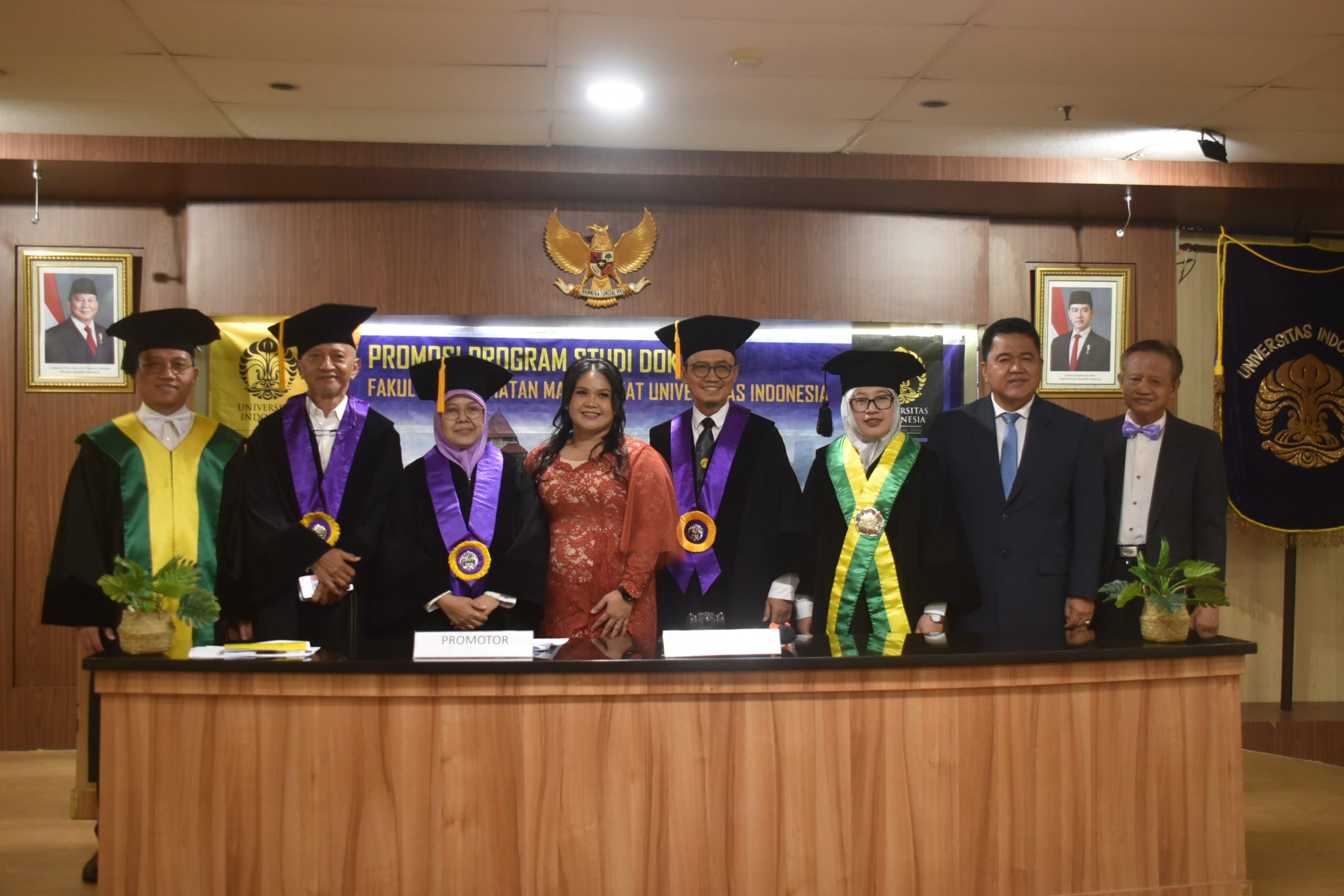The Faculty of Public Health (FPH) Universitas Indonesia (UI) has once again awarded a doctoral degree through a public Doctoral Promotion session held on Thursday, June 26, 2025. Doctoral candidate Eme Stepani Sitepu successfully presented and defended her dissertation before the examination board in the Doctoral Promotion Room, Building G, FPH UI. The session was chaired by Prof. Dr. drg. Wachyu Sulistiadi, M.A.R.S., and attended by the Promoter, Prof. Dr. Dumilah Ayuningtyas, M.A.R.S., as well as Co-Promoters Prof. dr. Purnawan Junadi, M.P.H., Ph.D., and Prof. Dr. Satibi, M.Si., Apt.
Eme’s dissertation, titled “Local Government Preparedness in Ensuring the Availability of Essential Medicines During the Pandemic (Case Study of West Java and Bali Provinces),” highlights the crucial role of local governments in ensuring the availability of essential medicines during public health crises. The experience during the COVID-19 pandemic revealed several limitations in the pharmaceutical management system, including gaps in planning, procurement, distribution, and inventory management. Although the 2021 report stated that 84.18% of districts/cities met the essential medicine availability indicator—surpassing the 81% target—the field implementation still faced numerous technical and structural challenges.
In response, Eme developed a conceptual model of local government resilience in ensuring the availability of essential medicines during a pandemic, using Van Meter and Van Horn’s policy implementation theory. The model is expected to be integrated into regional health systems to build greater resilience and adaptability for future health crises. Her qualitative research was conducted in two provinces—West Java (Depok City and Bogor Regency) and Bali (Denpasar City and Badung Regency)—using in-depth interviews, observations, and document analysis. The interview instruments underwent validation, achieving an I-CVI score of >0.83.
The study found that local government preparedness was low at the onset of the pandemic but improved over time with increased adaptation and capacity building. All actors involved in managing essential medicine availability were found to have performed their roles optimally, leading to the achievement of medicine availability targets in health centers and district/city levels during 2020–2022. “Key success factors included supportive policies and budgets, strong local leadership, cross-sector collaboration, and accurate medicine planning,” explained Eme.
However, several challenges persisted, such as limited human resources, infrastructure gaps, lack of integrated information systems, dependence on imported raw materials, and sectoral egos. A total of 37 indicators—22 main and 15 supporting—were identified to develop the dimensions of resilience, covering aspects such as policy objectives, resources, inter-agency communication, implementer characteristics, external environment, and implementer disposition.
This research not only focuses on the successful implementation of policies related to local government preparedness in ensuring essential medicine availability but also links it to resilience, resulting in recommendations for a local government resilience model in disaster situations. Based on her findings, Eme recommends that the Ministry of Health develop a national guideline to assess medicine management readiness—including essential medicines—during crises and provide continuous technical guidance and training for local health personnel.
For local governments, it is essential to ensure adequate budget allocations for essential medicine procurement, including contingency funds that can be accessed quickly and flexibly. “Moreover, the role of Standard Operating Procedures (SOPs) in essential medicine management should be strengthened and enforced as mandatory guidelines for all implementers, both at the regional level and in health service facilities such as health centers,” Eme added.
Based on the final decision of the Chair of the Session, Eme Stepani Sitepu was declared graduated with honors (cum laude), earning a GPA of 3.85. She becomes the 463rd doctoral graduate of FPH UI, the 13th doctoral graduate from the Public Health Sciences Program in 2025, and the 352nd from the Public Health Sciences Program overall. The examining committee included Prof. dr. Adang Bachtiar, M.P.H., D.Sc.; Prof. Dr. Susi Ari Kristina, M.Kes., Apt.; and Dr. dr. Maxi Rein Rondonuwu, DHSM., M.A.R.S.
As an academic institution committed to advancing public health in Indonesia, FPH UI once again proves its dedication to producing high-quality doctoral graduates. Through impactful and applicable research, FPH UI’s doctoral alumni are expected to strengthen the national health system, particularly at the local level. (DFD)

